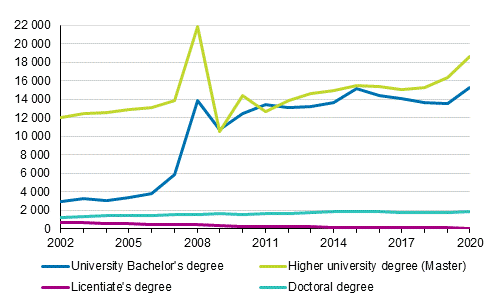Published: 12 May 2021
Number of university degrees continued growing
According to Statistics Finland’s education statistics, a total of around 35,800 university degrees were completed in Finland in 2020. The number of degrees increased by 13 per cent from the previous year. The number of lower university degrees went up by 12 per cent and that of higher university degrees by 14 per cent. The number of doctorate degrees grew by seven per cent.
Number of university degrees in 2002 to 2020

Most degrees, good 8,900, were completed at the University of Helsinki. The second most degrees were completed at the University of Tampere, nearly 4,300. Some 3,500 degrees were completed each at Aalto University, the University of Turku and the University of Jyväskylä. The smallest universities based on the number of degrees were the National Defence University (around 300 degrees) and the University of the Arts Helsinki (UniArts) (about 370 degrees).
Most degrees were completed in the field of business, administration and law (around 6,500). The number of degrees completed in humanities and arts was around 5,800 and in social sciences about 4,700. Doctorate degrees were completed most in the field of health and welfare (in total 416), natural sciences (in total 325) and technology (in total 293).
Around 30,500 new students began their university studies in 2020. The number is 13 per cent higher than one year earlier. The number of students starting studies for a lower university degree grew by 12 per cent from the year before and the share of those starting studies for a higher university degree by 16 per cent. The number of those starting studies for a doctorate degree was 10 per cent higher than in the year before.
A total of nearly 156,600 students attended university education leading to a degree in 2020. There were around 77,900 students studying for a lower university degree and about 59,900 studying for a higher university degree. Some 18,700 students studied in education leading to a post-graduate degree, around 600 of whom were studying for a licentiate degree and around 18,100 for a doctorate degree. Women made up 55 per cent of all students.
Women completed nearly 60 per cent of all university degrees. The share was on level with 2019. Examined by field of education, the highest numbers of students were studying in the field of arts and humanities, around 25,200 students. Around 23,500 students studied in the field of technology and around 23,200 in the field of business, administration and law. Women studied clearly more often than men in the fields of education (eight out of ten were women), arts and humanities, health and welfare, and social sciences, journalism and information (seven out of ten were women). Men, in turn, studied more often than women in the fields of information and communication technologies (eight out of ten were men), services and engineering, manufacturing and construction (seven out of ten were men).
In 2020, the University of Helsinki had the highest number of students, around 31,600. The next biggest universities by the number of students were the University of Tampere (close on 21,000 students) and Aalto University (good 18,000 students). More detailed time series data on university students and degrees by education and university are available in the database tables .
Source: Education. Statistics Finland
Inquiries: Vesa Hämäläinen 029 551 2594, koulutustilastot@stat.fi
Head of Department in charge: Hannele Orjala
Publication in pdf-format (166.6 kB)
- Tables
-
Tables in databases
Pick the data you need into tables, view the data as graphs, or download the data for your use.
Updated 12.5.2021
Official Statistics of Finland (OSF):
Students and qualifications [e-publication].
ISSN=2737-0410. University of applied sciences education 2020. Helsinki: Statistics Finland [referred: 22.2.2026].
Access method: http://stat.fi/til/opiskt/2020/15/opiskt_2020_15_2021-05-12_tie_003_en.html

